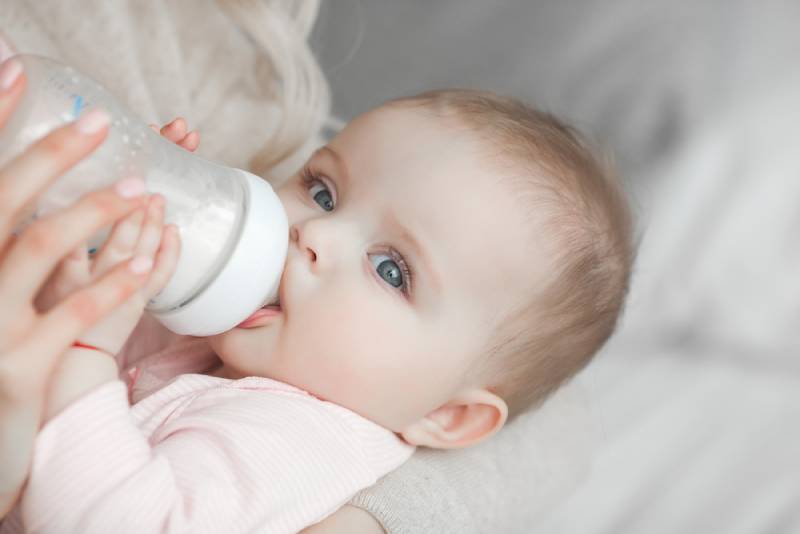Even though it sounds harmless at first, gas can cause quite a bit of trouble for babies. If your little one is formula-fed, one of the first things you should do is find the best formula for gassy babies to help reduce symptoms of gas.
Despite the fact that there is no single best formula for gassy babies, there are numerous brands that offer gentle formulations catering to babies with more sensitive tummies and even food allergies that could lead to gas.
One of the most common symptoms of a baby that’s suffering from gas is excessive crying, so finding a formula that will work and help your little one (and you!) get some precious sleep is absolutely imperative.
In addition to trying out different formulas, there are many natural remedies that you can try to relieve gassiness – ranging from massages, warm baths, to something that’s called a “gaspasser,” and we will cover them, too.
By the time you’re done reading, I’m sure you will be a pro at baby gas solutions! And your little one will be thankful as well.
1.Similac Pro-Sensitive Non-GMO Powder Infant Formula With Iron
- #1 BRAND FOR IMMUNE SUPPORT: Similac Pro-Sensitive is the first infant formula for sensitive tummies with 2’-FL HMO. (Based on Pediatrician Recommendations & IQVIA ProVoice Survey 12 months ending February 2020; not from human milk)
- FOR SENSITIVE TUMMIES: Designed for fussiness and gas due to lactose sensitivity.Not for infants or children with galactosemia
- IMMUNE SUPPORT: Similac Pro-Sensitive is the first infant formula with 2’-FL human milk oligosaccharide (Not from human milk.)
Prices pulled from the Amazon Product Advertising API on:
Product prices and availability are accurate as of the date/time indicated and are subject to change. Any price and availability information displayed on [relevant Amazon Site(s), as applicable] at the time of purchase will apply to the purchase of this product.
If you have noticed that your little one has a sensitive stomach, or you would just like to start with a formula that is geared towards intolerance to lactose right off the bat, then this Similac formula is a good first option to consider.
It’s free from genetically modified organisms (GMO), which is a very important factor to consider when deciding on the best formula for a gassy baby. In fact, this formula was specifically made with the prevention of gas in mind.
It will support your baby’s growth and development with lutein (an antioxidant) and vitamin E (particularly important for eye development), as well as with docosahexaenoic acid (DHA) – an omega-3 fatty acid that plays a big role in the development of the brain.
2. Enfamil NeuroPro Gentlease Baby Formula
- Contains 6 - 20 ounce containers of baby formula milk powder
- Enfamil NeuroPro Gentlease is the only sensitive baby formula that has a fat-protein blend of MFGM and Omega 3 DHA, previously only found in breast milk, that is clinically proven to reduce fussiness, colic, baby gas, and crying in 24 hours
- Complete nutrition for babies through 12 months, with Omega 3 DHA and Choline, important nutrients for brain support, easy-to-digest proteins, and baby probiotics for immune support
Prices pulled from the Amazon Product Advertising API on:
Product prices and availability are accurate as of the date/time indicated and are subject to change. Any price and availability information displayed on [relevant Amazon Site(s), as applicable] at the time of purchase will apply to the purchase of this product.
Enfamil is very well known for its range of formulas that cater to all sorts of needs, even babies with really severe acid reflux.
Even though it’s created with sensitive stomachs in mind, there is no shortage of healthy ingredients as it still contains DHA and milk fat globule membrane (MFGM).
If you haven’t heard of it yet, MFGM is a very important ingredient found in breast milk and is responsible for healthy brain development.
What’s more, a 2019 University of Kansas study had some very positive results regarding adding MFGM to formula.
Researchers found that this type of formula led to babies developing better motor skills, as well as language and cognitive skills when compared to babies who were fed with formula without this ingredient.
So, if you’re worried that formula might not cover all the bases that breast milk can, the NeuroPro Gentlease will assuage your concerns!
It is also very gentle on a baby’s digestive tract and will help with those difficult gas symptoms, making this a great choice if you’re looking for the best formula for gassy babies.
3. Enfamil Gentlease Sensitive Baby Formula
- Clinically shown to ease fussiness, colic, baby gas, and crying in 24 hours with baby probiotics and easy to digest proteins that have been partially broken down
- Gentle formula provides complete nutrition tailored for your baby through their first 12 months
- Contains omega 3 DHA and choline, important nutrients found in breast milk to provide brain support.
- Enfamil is the #1 pediatrician recommended brand
Prices pulled from the Amazon Product Advertising API on:
Product prices and availability are accurate as of the date/time indicated and are subject to change. Any price and availability information displayed on [relevant Amazon Site(s), as applicable] at the time of purchase will apply to the purchase of this product.
The main difference between this formula and the Enfamil covered above is the fact that regular Gentlease doesn’t contain MFGM, although this doesn’t have to be a dealbreaker.
In fact, the formula is made to soothe symptoms of gas and overall fussiness, which definitely puts it in the category of best formulas for babies with gas.
One of its ingredients is choline, another key component of breast milk that plays a major role in the development of a baby’s brain – even women who are breastfeeding are encouraged to consume enough choline in their food (it can be found in milk and eggs, for example).
The formula also contains selenium, another important nutrient for infants (it’s important during pregnancy, too) as it contributes to a healthy immune system.
4. Enfamil Enspire Gentlease Baby Formula Milk Powder
- Contains 1 20 ounce reusable tub of our closest baby formula ever to breast milk
- First and only baby formula in the US containing the ingredients Lactoferrin and MFGM making Enfamil Enspire & Enspire Gentlease Our Best for Your Best
- Lactoferrin is a key immune supporting protein found in colostrum and breast milk that provides immune support and intestinal development, and MFGM has been clinically proven to increase cognitive development compared to formulas without
- Our trusted Gentlease formula is clinically proven to reduce fussiness, gas & crying in 24 hours
Prices pulled from the Amazon Product Advertising API on:
Product prices and availability are accurate as of the date/time indicated and are subject to change. Any price and availability information displayed on [relevant Amazon Site(s), as applicable] at the time of purchase will apply to the purchase of this product.
When moms decide on a formula for the first time, they usually base their decision on how closely the formula mimics breast milk so that their baby can get the next best thing.
Unfortunately, gassy tummies can make it difficult to stick to your first choice, and many moms are forced to switch back and forth between different brands to find something that works.
That’s why I really love this formula because it has the best of both worlds – a formulation that will soothe your baby’s stomach while also providing them with the key ingredients they need to develop.
Apart from MGFM, the importance of which I’ve already mentioned above, it contains lactoferrin. This is an incredibly important component usually only found in human milk that helps build the baby’s immune system.
In addition, the formula comes with prebiotics that support the gastrointestinal system, which is great news if you have a gassy baby on your hands!
While this is one of the more expensive formulas, I would definitely recommend it as one of the best formulas for gassy babies that’s worth trying!
5. Gerber Good Start Soothe Non-GMO Powder Infant Formula
- SOOTHING NUTRITION: Modeled after the complete nutrition & gentleness of breastmilk, this formula offers nutrition for babies up to 12 months experiencing colic, excessive crying, fussiness & gas
- PROBIOTIC FORMULA: Good Start Soothe formula features prebiotics, Comfort Proteins & probiotics that improve the good bacteria in tummies & promote soft stools; Its our closest formula to breastmilk
- GIVE YOUR BABY A GOOD START: Your baby’s nutritional needs evolve over time; Thats why we created the Gerber Good Start line; Made to comfort your babys tummy & available in a range of products
Prices pulled from the Amazon Product Advertising API on:
Product prices and availability are accurate as of the date/time indicated and are subject to change. Any price and availability information displayed on [relevant Amazon Site(s), as applicable] at the time of purchase will apply to the purchase of this product.
When it comes to the best formula for gassy babies, the Gerber Good Start Soothe brand is another great option to add to your list!
It does a great job of relieving the symptoms of gas but has also worked wonders for babies with colic, so sensitive tummies will definitely agree with this formula.
In addition to DHA, the formula also contains probiotic Lactobacillus reuteri, which plays a significant role in improving many of the symptoms associated with digestive issues in infants.
The one downside of the Gerber Good Start Soothe is that it’s a little on the pricier end compared to other formulas, which is why it’s not a bad idea to try some of the more affordable brands first before giving this one a go.
6. Enfamil Nutramigen Hypoallergenic Colic Baby Formula
- Fast relief NOW - Manage colic due to cow’s milk allergy as early as the first feeding, with 90% of infants improving within 48 hours
- Helps support babys immune system to return to consuming traditional milk protein formula without an allergic response
- Includes the probiotic branded LGG—the most extensively studied probiotic for allergy management & supporting the digestive health of your baby
Prices pulled from the Amazon Product Advertising API on:
Product prices and availability are accurate as of the date/time indicated and are subject to change. Any price and availability information displayed on [relevant Amazon Site(s), as applicable] at the time of purchase will apply to the purchase of this product.
The crying and overall crankiness of babies who have too much gas trapped in their belly is usually a result of the baby swallowing too much air while feeding.
On the other hand, some infants have an intolerance to certain ingredients found in formula, such as cow’s milk protein, which causes their digestive issues.
Nutramigen doesn’t contain any lactose, making it perfect for little ones with milk allergies or just plain sensitivity to lactose.
The formula is enriched with both DHA and arachidonic acid (ARA) that contribute to the development of the brain, eyes, and immune system.
Unfortunately, Nutramigen is much less budget-friendly than some of the other brands I’ve recommended. However, this is to be expected from hypoallergenic brands as they have highly-specialized formulations.
7. Mama Bear Sensitivity Milk-Based Powder Infant Formula with Iron
- Closer to Breast Milk, Now With HMO For Immunity⁺
- For Fussiness & Gas When Sensitive to Lactose
- No Artificial Growth Hormones; Non-GMO
- Nutrition: Clinically proven to support growth and development
- Safety: Meets the nutritional and quality standards established by the FDA
Prices pulled from the Amazon Product Advertising API on:
Product prices and availability are accurate as of the date/time indicated and are subject to change. Any price and availability information displayed on [relevant Amazon Site(s), as applicable] at the time of purchase will apply to the purchase of this product.
Mama Bear Sensitivity is actually a generic version of the Similac Pro-Sensitive formula, meaning that it’s one of the best baby formulas for moms on a budget!
This GMO-free formula is perfect for little ones who are a little sensitive to lactose, but will not be a good choice for babies with cow’s milk allergy.
Among other important ingredients found in different formula brands, this Mama Bear formula contains human milk oligosaccharide (HMO), a prebiotic that babies usually get from breast milk and important for immune system development.
It also includes DHA for healthy brain development.
8. Earth’s Best Organic Low Lactose Sensitivity Infant Powder Formula with Iron
- Easy-to-digest organic formula for babys first twelve months for babies with sensitive stomachs
- Reduced lactose milk-based powder formulation for easy digestion. 95% less lactose as compared to standard milk based formulas
- Omega-3 DHA and Omega-6 ARA fatty acids naturally found in breast milk to that may support brain and eye development, Iron for healthy development
- Easy to digest and nutritionally complete with lutein for eyes and prebiotic fructooligosaccharides for immunity
Prices pulled from the Amazon Product Advertising API on:
Product prices and availability are accurate as of the date/time indicated and are subject to change. Any price and availability information displayed on [relevant Amazon Site(s), as applicable] at the time of purchase will apply to the purchase of this product.
Considering that formula is a baby’s primary source of food in the first year of their life, it’s natural to consider the healthiest options that are available.
For moms that are partial to organic products, this formula will tick all the boxes – not only is it certified organic by the US Department of Agriculture (USDA) but you won’t find any artificial colors or flavorings on its list of ingredients.
Aside from being organic, this formula is perfect for little ones for whom lactose is the biggest source of their gassiness. Finally, you can say goodbye to your baby farting up a storm!
This non-GMO formula also comes with all the essential ingredients (DHA and ARA) that are needed for your little one’s development.
9. Earth’s Best Organic Gentle Infant Powder Formula with Iron
- An organic gentle formula for babys first twelve months, designed for babies with sensitive stomachs or tolerance issues
- Made from easy to digest proteins, including partially hydrolyzed whey, for fussiness, gas, and crying
- Includes Omega-3 DHA that supports brain and eye development and water-assisted extracted DHA without the use of chemical solvents
Prices pulled from the Amazon Product Advertising API on:
Product prices and availability are accurate as of the date/time indicated and are subject to change. Any price and availability information displayed on [relevant Amazon Site(s), as applicable] at the time of purchase will apply to the purchase of this product.
The biggest difference between the organic formula above and this gentle formulation lies in lactose – while the abovementioned has reduced lactose, Earth’s Best Organic Gentle formula contains proteins that aren’t too heavy on a baby’s tummy.
This means that digesting the formula will be much easier for your little one, leading to less gas and crying!
Another difference is the corn syrup solids, which can be found in this formula and not in the one above.
Other than that, your baby girl or baby boy will get all the important nutrients with this formula, such as DHA, ARA, iron, and lutein.
10. Happy Baby Organic Infant Formula Milk-Based Powder with Iron
- WITH 4X MORE PREBIOTICS than most other organic infant formula, our formula delivers two prebiotics, GOS & FOS, fibers that mimic the function of prebiotics found naturally in breast milk, which promote healthy gut bacteria in infants. No corn syrup.
- HAPPY BABY: At Happy Baby Organics, we provide organic and delicious options for your babys nutritional journey. We develop premium organic recipes perfectly matched with your childs age and stage. This is enlightened nutrition for every family.
Prices pulled from the Amazon Product Advertising API on:
Product prices and availability are accurate as of the date/time indicated and are subject to change. Any price and availability information displayed on [relevant Amazon Site(s), as applicable] at the time of purchase will apply to the purchase of this product.
I always think it’s a good idea to compare two similar formula brands, which is why I’ve also included the Happy Baby organic formula for you to consider.
Like its competitor, it’s also certified organic. Plus, you won’t find any corn syrup solids in this formula!
As for its other ingredients, it contains prebiotics called GOS and FOS – they support the “good” bacteria in the baby’s gastrointestinal system, which keeps your little boy or girl’s tummy happy and healthy.
Because this is a stage 2 formula, it can only be given to your little one after 6 months of age until the age of 1, so keep this in mind before purchasing.
11. Similac Pro-Total Comfort Infant Formula OptiGRO
- GENTLE FORMULA + IMMUNE SUPPORT: A non-GMO formula with 2’-FL HMO for Immune Support. Easy-to-digest, gentle proteins designed for sensitive stomachs
- LESS FUSSINESS & CRYING: Parents reported a significant reduction in fussiness, gassiness and crying after just 1 day of feeding (After switching to Pro-Total Comfort)
- CLOSER TO BREAST MILK: With 2’-FL HMO, a unique prebiotic like that found in breast milk. Supports baby’s developing immune system and closes 5 gaps in immune function between formula-fed and breastfed infants
Prices pulled from the Amazon Product Advertising API on:
Product prices and availability are accurate as of the date/time indicated and are subject to change. Any price and availability information displayed on [relevant Amazon Site(s), as applicable] at the time of purchase will apply to the purchase of this product.
Similac Pro-Total Comfort formula is definitely a strong contender for the title of best formula for gassy babies!
The reason why it works well as a sensitive formula is because it contains proteins that have been broken down to be gentle on an infant’s stomach, which makes it perfect not only for babies with gas but with other digestive issues as well.
What’s more, the added HMO prebiotic will support and strengthen your little one’s immune system.
If you are concerned about GMOs, you can rest assured that this particular brand doesn’t contain any. In addition, it doesn’t have any artificial growth hormones either.
12. PurAmino DHA/ARA Hypo-Allergenic Powder Formula
- Puramino is a hypoallergenic, iron fortified, and amino acid based baby and toddler Formula for the dietary management of infants and toddlers with severe cows milk protein and multiple food allergies
- Also suitable for conditions such as protein maldigestion, malabsorption/chronic diarrhea, short bowel Syndrome and eosinophilic esophagitis
- Puramino can be an infant’s sole nutrition source through 6 months of age, and be a major supplemental nutrition source up to 2 years old
Prices pulled from the Amazon Product Advertising API on:
Product prices and availability are accurate as of the date/time indicated and are subject to change. Any price and availability information displayed on [relevant Amazon Site(s), as applicable] at the time of purchase will apply to the purchase of this product.
Having a baby who seems to be allergic to everything can be an incredible challenge, especially when no other infant formula seems to be working and only contributes to their tummy problems.
Luckily, PurAmino is specially made with these babies in mind – those who have allergies to cow milk’s protein but also more serious conditions that demand a specific diet.
This formula can be used by babies from birth until 2 years of age and it contains all the important nutrients that can be found in other formula brands.
13. Enfamil ProSobee Soy Sensitive Tummy Baby Formula
- Made for gassy babies
- Reduces crying and tummy pain
- Best choice for your little one
Prices pulled from the Amazon Product Advertising API on:
Product prices and availability are accurate as of the date/time indicated and are subject to change. Any price and availability information displayed on [relevant Amazon Site(s), as applicable] at the time of purchase will apply to the purchase of this product.
For some babies, completely switching a milk-based formula for a soy one can be very helpful in managing their gassiness, although this doesn’t work in every case.
Because soy formula doesn’t contain any lactose or cow milk protein, it can work well for little ones who are sensitive to these ingredients, no matter if this manifests as gas, spitting up, or overall crankiness.
Plus, it contains both DHA and choline, so you won’t be skipping out on any of the important nutrients that can be found in other brands, nor jeopardizing your baby’s health in any way.
14. Similac Alimentum Hypoallergenic Infant Formula
- 24-HOUR DIFFERENCE: Our hypoallergenic formula starts reducing excessive crying due to protein sensitivity within 24 hours
- EASY TO DIGEST: Lactose-free formula has broken down proteins that are easier to digest for babies with food allergies. No artificial growth hormones
- MOST RECOMMENDED BRAND: #1 pediatrician recommended brands
Prices pulled from the Amazon Product Advertising API on:
Product prices and availability are accurate as of the date/time indicated and are subject to change. Any price and availability information displayed on [relevant Amazon Site(s), as applicable] at the time of purchase will apply to the purchase of this product.
Any kind of formula that is marketed for colic and other sensitivities will be suitable for babies with gas, too, which is why I’ve decided to include Similac Alimentum to this list.
Even though the price is much less budget-friendly when compared to non-hypoallergenic formulas, this brand has worked for many babies who cannot tolerate formula with lactose – and the improvement in symptoms can be noticed pretty quickly!
What Are The Symptoms Of A Gassy Baby?

A baby’s stomach is a very delicate system that can easily be thrown off balance and cause all sorts of trouble for both the parents and the baby. And by trouble, I mean constant crying, sleepless nights, and hours spent on Google looking for a solution.
As babies can’t communicate what is exactly wrong with them or where it hurts, we have to play a guessing game to determine the exact cause behind all that fussiness and crying.
For adults, gas is a pretty harmless (if annoying) occurrence, so many new moms get quite surprised when they realize that a gassy baby isn’t too happy about all the extra air trapped in their tummy.
If your little one is crying at times when you know they’re not hungry or want to sleep, then you can be certain that he or she is probably having problems with gas. The crying can also be accompanied by your baby passing gas.
Other symptoms to watch out for include a bloated tummy and your baby lifting his or her back and legs.
While gassiness is entirely normal for infants, you should get in touch with a pediatrician in case your baby is crying as a result of gas for more than an hour every day or seems to be really fussy almost all the time.
Excessive gas and bloating can even result in the baby not getting enough sleep or food, so finding ways of relieving gas is really important.
What Causes Gas In Babies?

The main reason why babies get gas in the first place is quite simple – air. Swallowing air is very common for babies and it doesn’t have to happen only during feeding sessions.
For example, a baby can get a lot of air in their tummy simply when crying, so calming your little one down as quickly as possible will minimize his or her chances of getting gassy later on.
Of course, digestive issues can also be the root cause of an infant’s upset stomach. Excessive gas can be caused by acid reflux, a change in the baby’s diet, constipation, and even a stomach virus.
During your feeding sessions, make sure not to give your baby too much at a time, as this can cause gas as well.
A baby can also be really sensitive, and maybe even allergic, to a certain type of formula or food, which is why finding a gentle formula for your little one can be incredibly helpful in preventing gassiness.
Is There A Difference Between Formula-Fed And Breastfed Babies?
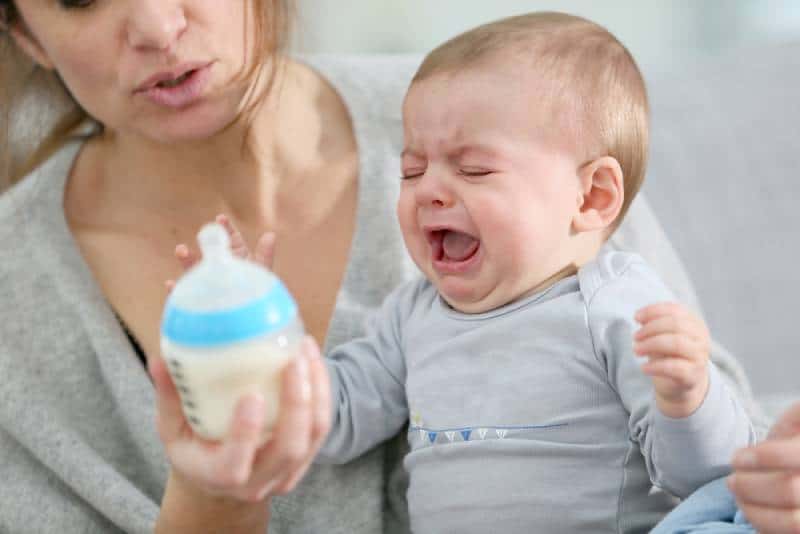
Even though breastfeeding can be very helpful for babies with acid reflux, for example, gassiness can be an equally bad problem for babies who are fed formula and fed breastmilk.
This is because a baby can swallow air while breastfeeding just as much as while being fed through a bottle. If you are nursing, make sure that your baby is latched on properly, keeping any extra air out.
On the other hand, what a mom eats can also cause gas for a breastfed baby, so keeping an eye on your diet and avoiding foods that contribute to gas build-up can be helpful.
Foods that contain lots of fiber – even though they are great for your digestive system – should be avoided, as well as vegetables such as onions and broccoli.
Here’s the thing, though: Completely removing foods that cause gas from your diet is quite difficult, and not every mom has the means to completely revamp her eating habit.
And even if she does, it might not completely get rid of the baby’s gas because they can still swallow air while nursing.
If you are feeding your baby through a bottle, opt for ones that are designed in a way that prevents colic.
Such bottles reduce the amount of air the baby swallows while drinking milk, which helps with symptoms of colic as well as gas.
Naturally, switching formulas to one that might be a bit easier on the baby’s stomach is one of the first options that should be explored if your baby isn’t being breastfed.
How Do I Relieve My Baby’s Gas Symptoms?
Apart from switching from the formula you are using now for one that your baby will tolerate better, there are plenty of other remedies that I definitely recommend you try to bring your baby relief.
Some of them are natural, while others contain supplements or even medication. As a rule of thumb, medication should be a last resort and you should only try it out after talking to a healthcare professional who can give you tailored advice.
Most parents find that a combination of remedies works best for their baby, so take some time to see what makes your little one feel better.
Gentle massaging
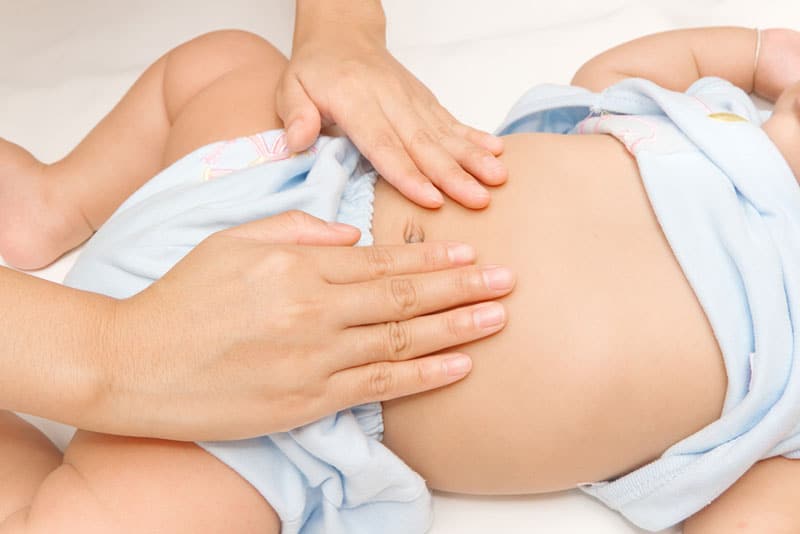
Babies who are suffering from gas are often very tense. In this case, gently massaging their entire body (focusing on their tummy area) could bring them some comfort and help them get rid of the built-up gas in their belly.
When your hand is on the baby’s tummy, make a gentle clockwise movement – this can also be done using two or three fingers. The motion from left to right will help the baby pass any gas that’s still in the colon and causing pain and discomfort.
In addition, you can also try this massage when your little one is constipated.
Make sure to watch out for your baby’s cues and if you find that the massage is only making them feel worse, it’s best to stop and try later or attempt another solution.
Chamomile
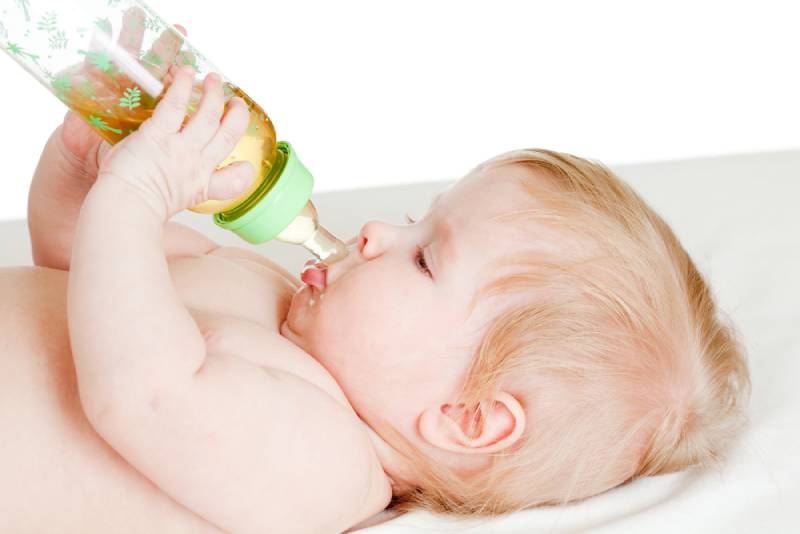
While this is a remedy that should first be taken up with your doctor, chamomile tea has been used by many parents to soothe and calm their baby, regardless of whether they’re suffering from colic, gas, or are simply a little fussier than usual.
Not only can chamomile be useful for any sort of issue concerning the digestive system, including constipation and gas, it can also help babies fall asleep, especially if they are too tired and have been crying a lot.
Once you’ve spoken to a medical professional and got all the necessary info with regards to how much chamomile tea you are allowed to give to your baby, make sure to purchase a chamomile tea that comes in bags only.
This protects the herbs from contamination, so it’s a much safer alternative.
A warm bath

Is there anything that a nice, warm bath can’t fix? As far as gas build-up goes, warm water does a great job of relaxing those tense stomach muscles and helping the baby pass gas.
Be prepared, however, for your baby to go number 2 in the water, especially if his or her gas problems were accompanied by constipation. As an alternative, you can soak a towel in a bit of warm water, squeeze the water out, and then place it on your baby’s tummy.
Don’t forget to burp twice

If we take into account that most gas problems are a result of the baby swallowing too much air while feeding, then it’s pretty self-explanatory to burp the baby more than one time.
Whether you’re breastfeeding or using the bottle, make a quick break in the middle of the feeding and burp the baby, and then once more after the feeding.
In this way, you will make sure to get rid of any excess air in time before it moves lower into the bowels and turns into gas.
This will also help your little one get enough food, as air in their belly can make them feel full even though they’re not. So burping twice will ensure they’re feeding as much as they should.
Proper positioning

In addition to burping, there are feeding positions you can try that reduce the amount of air swallowed by your baby.
The most important thing is to make sure that the baby’s head is elevated while feeding and not level with their tummy – this goes for both breast and bottle feedings.
If you are using a bottle, remember to tilt it (the bottom of the bottle goes up) and wait for the nipple to fill up with milk before giving it to your little one. This gets all the air out of the nipple before it reaches the baby’s mouth.
Like I’ve already mentioned above, go for a bottle that was made with colicky babies in mind and use a nipple with the proper milk flow for your baby’s age.
If you have switched to a faster flow nipple and have found that it causes your baby to get more gassy than usual, switch back to one with a slower flow.
Baby exercises

Getting up and moving around after eating really improves digestion, that’s why taking a quick walk after a meal is really helpful for adults with digestive problems.
Babies, too, can benefit from quick exercises that have been adapted to their age. One of the best (and really fun) ways to relax and get those little muscles moving is by doing the bicycle exercise.
Simply place your baby on their back, take their legs in your hands, and gently move them back and forth like you do when riding a bike. Some babies even find this really fun!
Alternatively, you could take both legs and gently bring them to the baby’s belly at the same time. Hold them in place for a few seconds, then let go, and repeat the movements until the baby passes gas.
Gripe water

Gripe water is considered to be a natural remedy for babies who suffer from gas and colic, but before giving it to your baby, you should always talk to your pediatrician who can determine whether it’s safe for your little one.
Many parents discovered that gripe water worked wonders for their baby, even though the jury is still out regarding its efficacy. In fact, there haven’t been any scientific studies that were able to prove it works. Still, there are many moms who swear by it!
Gripe water usually contains different herbs, such as fennel, and even though it is readily available as an over-the-counter medication, always consult with a healthcare professional with regards to which brand you should choose.
After all, gripe water is considered to be a supplement by the FDA, so it’s not subject to tight regulations and the ingredients that are shown on the box might not fully correspond to the actual contents of the water.
Try tummy time

Tummy time is really important for infants, and not just because it helps them deal with gas! When your baby spends some time on their stomach, they develop their muscles, which they will need as they transition into their crawling and walking stage.
Plus, this will ensure the baby doesn’t develop any flat spots on the back of their head. Just a few minutes every day will be enough, although avoid placing the baby on their stomach right after they eat.
Despite all the benefits that tummy time brings, when you put your baby down to sleep in their crib at night, he or she should be lying flat on their back and never on the stomach, as this can lead to suffocation.
Gas drops

If natural remedies haven’t shown much promise regarding your baby’s gas problems, talk to your doctor about using gas drops to relieve some of the symptoms.
These drops help babies by dissolving the bubbles of gas in their belly (thanks to simethicone, their active ingredient) and they can be administered directly through a dropper or combined with breast milk or formula.
Even though gas drops don’t always work, they’re usually very affordable so it’s worth giving them a try, especially since they’re very safe for use.
Probiotics

Probiotics are usually defined as the “good” bacteria in our stomachs that help us digest food and keep our digestive system in good shape. Adults can take them in supplement form but they can also be found in foods such as milk and yogurt.
So, it doesn’t come as a surprise that many companies have come out with probiotics for infants, which can help with different gastrointestinal issues and even colic.
It goes without saying, of course, that an infant probiotic should only be used after your doctor gives you the green light.
Like gripe water, probiotics are also supplements, so they are not as tightly controlled as other medications, which should also be kept in mind if you decide to consider them.
Gaspassers
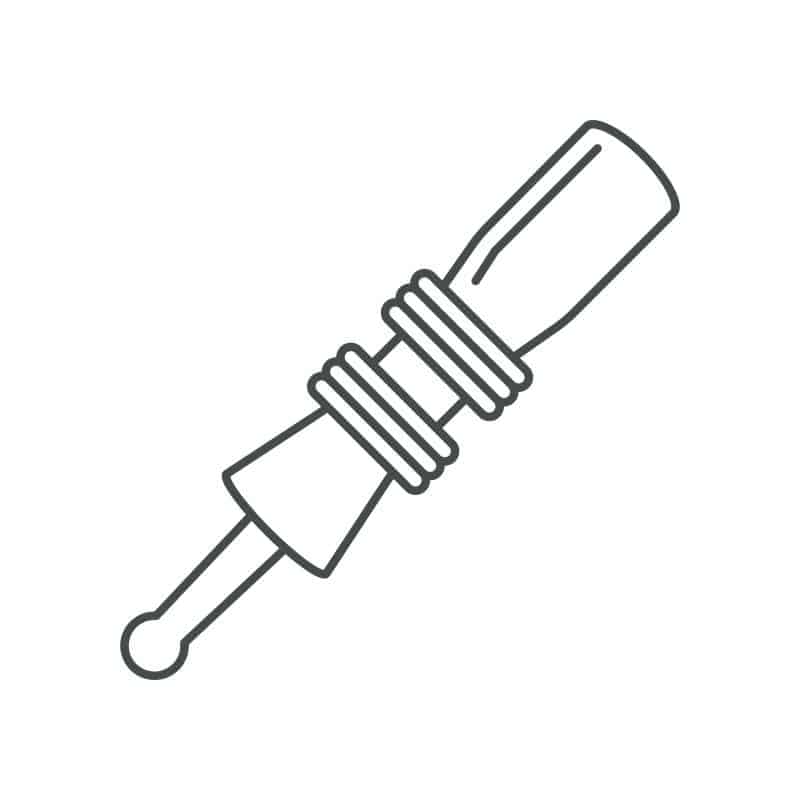
Gaspassers are small, disposable devices (similar to a catheter or a small straw) that are carefully inserted into a baby’s bottom to let the gas out.
While this procedure might not be every parent’s cup of tea, many parents found that it really brought their baby some much-needed relief when nothing else worked.
What’s more, gaspassers eliminate the need for using gripe water or gas drops, so it’s a great option to consider if you would like to avoid giving medication to your infant.
Just make sure to have a diaper handy to protect yourself from any incoming poop!
Bouncing

If all else fails, the good old baby bouncing strategy might do the trick to soothe your fussy baby. For gas relief, put the baby in your lap and gently bounce them up and down – the movement could let out the trapped gas.
That said, only try bouncing the baby around a half-hour after a feeding, as I’m sure you would hate for your little one to spit up all their food.
To Wrap Up
Motherhood brings many changes, some more obvious than others. For example, you probably never thought you would be talking so openly with other people about what the best ways are for a baby to pass gas, and yet, here you are!
No matter how difficult it can sometimes be to deal with a fussy baby and simply make him or her feel better, you can take comfort in the fact that this is just another growing pain of being a mom! Sooner or later, your little one will outgrow this stage as well.
The best formula for gassy babies will definitely vary from one baby to another, especially if your little boy or girl has food allergies that require really sensitive formulas that won’t irritate their gastrointestinal system.
I hope you found my picks insightful and helpful, and I’m sure that you will find one that is a perfect match for your precious one. And remember – when in doubt, always ask your pediatrician for advice!
References:
Li, F., Wu, S. S., Berseth, C. L., Harris, C. L., Richards, J. D., Wampler, J. L., Zhuang, W., Cleghorn, G., Rudolph, C. D., Liu, B., Shaddy, D. J., & Colombo, J. (2019). “Improved Neurodevelopmental Outcomes Associated with Bovine Milk Fat Globule Membrane and Lactoferrin in Infant Formula: A Randomized, Controlled Trial”. The Journal of pediatrics, 215, 24–31.e8.
Like this post? Please share or pin it for later. You can also stay in the loop and follow us on Facebook, Instagram or Pinterest.
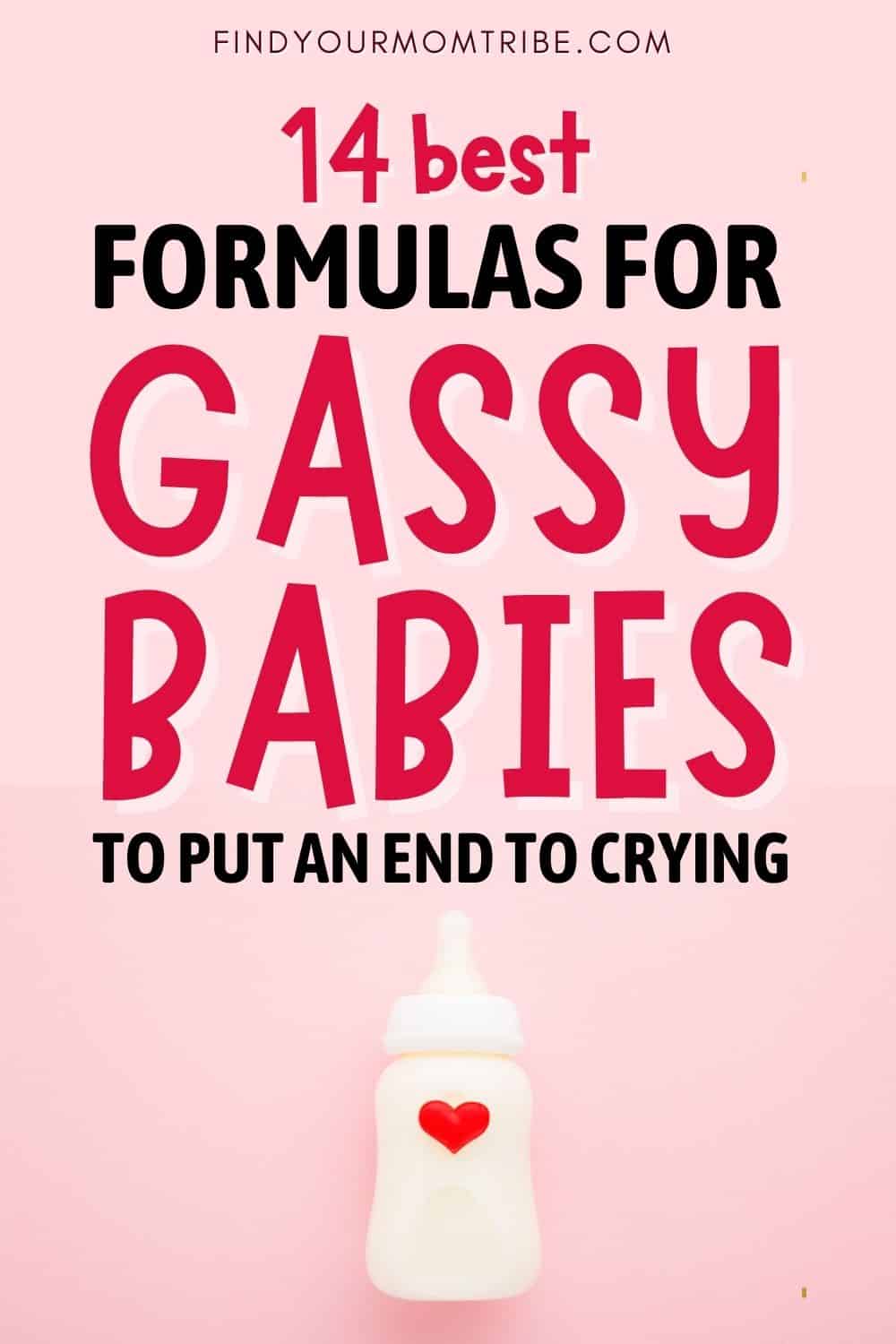
We love honesty! Find Your Mom Tribe is an Amazon Associate and we earn from qualifying purchases through affiliate links at no extra cost to you. Please see our full Amazon Affiliate disclosure for more information.

